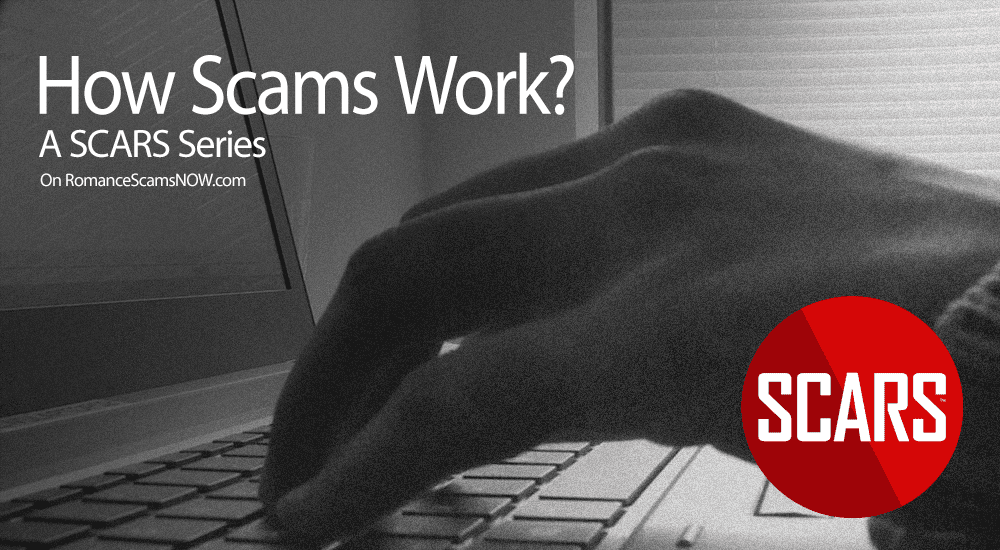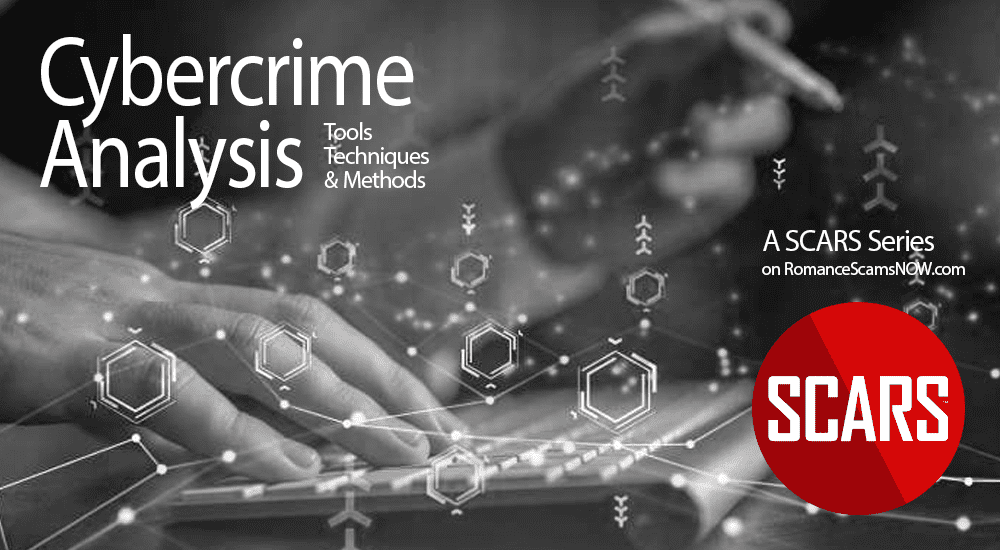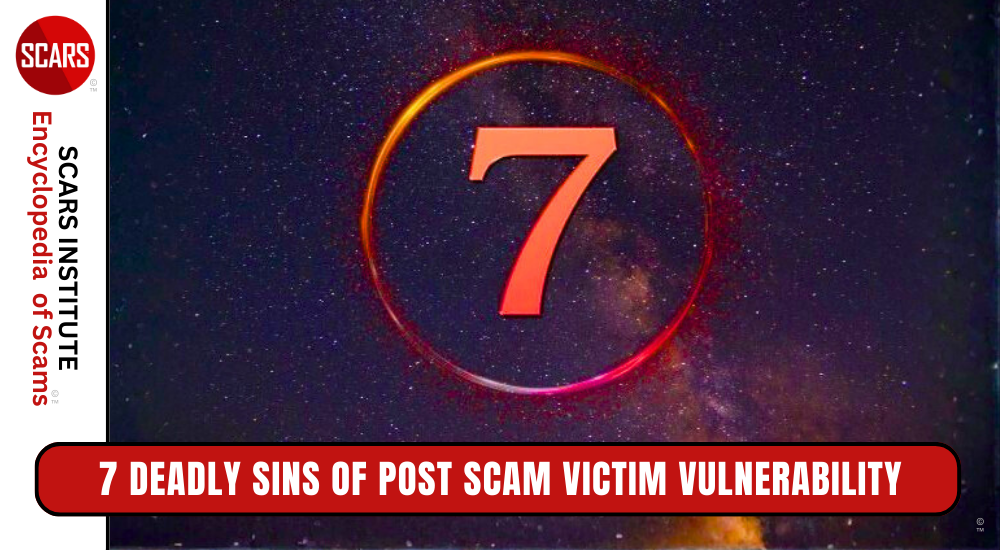
SCARS Institute’s Encyclopedia of Scams™ Published Continuously for 25 Years

How To Apply The Cybercrime Analysis Diamond Model To Help Scam Victims Better Understand Their Scams And To Accept The Truth Faster
The Diamond Model of Cybercrime Analysis can be applied to relationship scams to aid victims in better understanding the crime by providing a framework for understanding the motives, methods, and targets of the scammers.
Why would Scam Victims use the Diamond Model to Analyze their Relationship Scams?
After someone has become the victim of a relationship scam (romance scams, pig butchering crypto investment scams, etc.) they can have difficulty fully understanding that it was a crime, and how it actually worked. This approach to cybercrime analysis can help them overcome that.
By sitting down and applying cybercrime analysis to their crime they can gain a very important perspective of the crime that allows them to accept the truth more easily, and put the crime in the proper perspective that will help in their recovery.
Understanding the Cybercrime Analysis Diamond Model Approach
Victims of relationship scams can use the Diamond Model to analyze their cybercrime experiences in a number of ways:
- To gain a better understanding of the scammer’s motives, methods, and targets. By understanding the scammer’s motivations, victims can better understand why they were targeted. By understanding the scammer’s methods, victims can learn how to avoid being scammed in the future. By understanding the scammer’s targets, victims can learn about the types of people who are most likely to be targeted by scammers.
- To identify areas where they may have been vulnerable to the scam. By analyzing their own behavior, victims can identify areas where they may have been more susceptible to the scammer’s manipulation. This can help victims to avoid being scammed in the future.
- To develop coping mechanisms for dealing with the emotional impact of the scam. By understanding the dynamics of relationship scams, victims can better understand the emotional impact that the scam has had on them, such as trauma, grief, and other significant psychological and emotional effects. This can help victims to develop coping mechanisms for dealing with the emotional trauma of the scam and the need for professional support.
- To seek justice against the scammer. By gathering information about the scammer, victims can help law enforcement to track down and prosecute the scammer when possible. This can help victims to feel a sense of justice and closure.
In addition to the above, the Diamond Model can also be used by victims of relationship scams to better understand the crime to take action to help others!
- Educate others about relationship scams. By sharing their experiences, victims can help to raise awareness of relationship scams and to prevent others from being victimized.
- Advocate for changes to the law or to policies that could help to prevent relationship scams. By speaking out about their experiences, victims can help to make it more difficult for scammers to operate.
The Diamond Model is a valuable tool that can be used by victims of relationship scams to gain a better understanding of their experiences and to take steps to move forward from the scam.
What is the Diamond Model in Cybercrime Analysis?
The Diamond Model of Intrusion Analysis is a framework for understanding and analyzing cybercrimes. The model is based on four key elements:
- Adversary: The individual or group responsible for the cybercrime – usually the criminals.
- Capabilities: The tools, techniques, and procedures used by the adversary.
- Infrastructure: The physical and logical resources used by the adversary.
- Victim: The target of the cybercrime.
Using this Cybercrime Analysis tool or framework allows us to better understand the crime and see how it worked
By analyzing these four elements, security analysts can gain a better understanding of the motives, methods, and targets of cybercriminals. This information can then be used to develop more effective security measures.
How Does this Cybercrime Analysis Tool Work?
The Diamond Model works by providing a structured approach to cybercrime analysis. By focusing on the four key elements of the model, analysts can gather information about the adversary, their capabilities, their infrastructure, and their victims. This information can then be used to develop a more complete picture of the cybercrime and to identify potential areas for investigation.
In addition to the four key elements, the Diamond Model also includes a number of meta-features. These meta-features are characteristics of the cybercrime that can provide additional insights into the adversary’s motivations and capabilities. Some examples of meta-features include:
- Intent: The adversary’s goals for the cybercrime.
- Planning: The amount of time and effort the adversary put into planning the cybercrime.
- Resources: The amount of resources the adversary has available.
- Skill level: The adversary’s technical skills.
- Tradecraft: The adversary’s methods for evading detection.
By analyzing the meta-features of a cybercrime, security analysts can gain a better understanding of the adversary’s motivations and capabilities. This information can then be used to develop more effective security measures.
The Diamond Model is a valuable tool for security analysts because it provides a comprehensive view of cybercrimes. By using the model, security analysts can gain a better understanding of the motives, methods, and targets of cybercriminals. This information can then be used to develop more effective security measures.
Using the Diamond Model to Analyze Relationship Scams
1. Adversary:
The adversary in a relationship scam is the scammer. Scammers are typically motivated by financial gain. They may also be motivated by emotional gratification or the desire to control others. Scammers often use fake profiles and personas to deceive victims. So you can put in this area the names that were used or you can just call them ‘The Criminals.’
2. Capabilities:
Scammers use a variety of capabilities to carry out their scams.
This is not rewriting all of the scammer’s lies and dialog. This is about breaking down what they used and how they used it. You will spend the most time in this section.
These capabilities may include:
- Lures: What were the lures that the criminals used to pull you in?
- Grooming Process: How did the scam begin? How did they groom you?
- Psychological Manipulation: List the manipulative techniques that you believe the criminals used on you. There may actually be dozens of these depending on your understanding of them.
- Social engineering: Scammers use social engineering techniques to build trust with victims and manipulate them into providing money or personal information.
- How Your Own Brain Worked Against You: Scammers include your own brain in their capabilities, such as your Amygdala, Cognitive biases, and more. List them.
- Situations: In many scams, the situation is a big part of what the criminals count on to drive the scam forward. What were those situations?
- Your Vulnerabilities: List out your own vulnerabilities that both led up to the scam and what you believe contributed to the grooming, manipulation, and control.
- Post-Scam Control: Scammers have the capability to influence the victim long after the scam ends. What were those influencers?
3. Infrastructure:
Scammers use a variety of infrastructure to support their activities. This infrastructure may include:
- Financial Accounts: They often have victims create bank accounts or get access to the victim’s accounts.
- Online communication: Scammers use online communication platforms, such as dating websites, social media, and email, to connect with victims.
- Fake Profiles & Accounts: Scammers use both dating and social media platforms to create fake profiles and accounts to be used as lures, communication mediums, and reference information they use during the crime. List those you interacted with.
- Fake Websites & Apps: Scammers create fake websites or apps that appear to be legitimate businesses or organizations to facilitate the scams.
- Domain Names: Scammers use domain names for their fake websites, phishing emails, etc.
- Web Hosting Services: Scammers use web hosting services to host their fake websites – you can see who is hosting their fake websites on www.WhoIs.com this is important in the analysis but can also be important to the police when the crime is reported.
- Banks, Financial Institutions, and Money Transfer Services: Scammers use financial institutions or money transfer services to collect money from victims.
- Cryptocurrency Wallets or Platforms: Scammers often request cryptocurrencies. What wallets did you send from or two, through what services or exchanges?
4. Victim:
The victim in a relationship scam is the person who is targeted by the scammer, but also those affected by the scam – this can include family and friends. Be sure to list everyone who is affected.
5. Meta-features:
The meta-features of a relationship scam can provide insights into the scammer’s motivations and capabilities. Some examples of meta-features include:
- Intent: The scammer’s intent is to obtain money or personal information from the victim. Of course, the scammers only have one intent – that is to get your money!
- Planning: Scammers often spend a significant amount of time planning their scams. This is often done while the scam is running. List any plans the scammer expressed to you as well and how they keep any promises made.
- Resources: Scammers may have access to a variety of resources, such as fake websites, domain name registration services, and web hosting services. You would list those in INFRUSTRUCTURE above.
- Skill level: Scammers may have a high level of skill in social engineering and online communication. How skillful do you think the criminals were?
- Tradecraft: Scammers may use a variety of methods to evade detection. What do you think they used or engaged in?
Summarizing this Cybercrime Analysis Model
By understanding the Diamond Model of Cybercrime Analysis, victims of relationship scams can gain a better understanding of the crime and how they were targeted. This information can help victims to recover from the scam and to avoid being targeted in the future.
In addition to the Diamond Model, victims of relationship scams can also benefit from understanding the following:
- The psychology of scams: Scammers use a variety of psychological techniques to manipulate victims. By understanding these techniques, victims can be more aware of the scammer’s tactics and less likely to fall for them. You will find hundreds of articles on this here on RomanceScamsNOW.com, on ScamsNOW.com, and on ScamPsychology.org
- The warning signs of a scam: There are a number of warning signs that can indicate that a relationship is a scam. By being aware of these warning signs, victims can identify potential scams and avoid being targeted. By doing this analysis you will be better able to learn how these scams function and avoid them in the future.
- The resources available to victims: There are a number of resources available to victims of relationship scams. These resources can provide support and assistance to victims as they recover from the scam. See the SCARS Resources below.
Do It Yourself Cybercrime Analysis
-/ 30 /-
What do you think about this?
Please share your thoughts in a comment below!
Table of Contents
LEAVE A COMMENT?
Recent Comments
On Other Articles
- Arwyn Lautenschlager on Love Bombing And How Romance Scam Victims Are Forced To Feel: “I was love bombed to the point that I would do just about anything for the scammer(s). I was told…” Feb 11, 14:24
- on Dani Daniels (Kira Lee Orsag): Another Scammer’s Favorite: “You provide a valuable service! I wish more people knew about it!” Feb 10, 15:05
- on Danielle Delaunay/Danielle Genevieve – Stolen Identity/Stolen Photos – Impersonation Victim UPDATED 2024: “We highly recommend that you simply turn away form the scam and scammers, and focus on the development of a…” Feb 4, 19:47
- on The Art Of Deception: The Fundamental Principals Of Successful Deceptions – 2024: “I experienced many of the deceptive tactics that romance scammers use. I was told various stories of hardship and why…” Feb 4, 15:27
- on Danielle Delaunay/Danielle Genevieve – Stolen Identity/Stolen Photos – Impersonation Victim UPDATED 2024: “Yes, I’m in that exact situation also. “Danielle” has seriously scammed me for 3 years now. “She” (he) doesn’t know…” Feb 4, 14:58
- on An Essay on Justice and Money Recovery – 2026: “you are so right I accidentally clicked on online justice I signed an agreement for 12k upfront but cd only…” Feb 3, 08:16
- on The SCARS Institute Top 50 Celebrity Impersonation Scams – 2025: “Quora has had visits from scammers pretending to be Keanu Reeves and Paul McCartney in 2025 and 2026.” Jan 27, 17:45
- on Scam Victims Should Limit Their Exposure To Scam News & Scammer Photos: “I used to look at scammers photos all the time; however, I don’t feel the need to do it anymore.…” Jan 26, 23:19
- on After A Scam, No One Can Tell You How You Will React: “This article was very informative, my scams happened 5 years ago; however, l do remember several of those emotions and/or…” Jan 23, 17:17
- on Situational Awareness and How Trauma Makes Scam Victims Less Safe – 2024: “I need to be more observant and I am practicing situational awareness. I’m saving this article to remind me of…” Jan 21, 22:55
ARTICLE META
Important Information for New Scam Victims
- Please visit www.ScamVictimsSupport.org – a SCARS Website for New Scam Victims & Sextortion Victims
- Enroll in FREE SCARS Scam Survivor’s School now at www.SCARSeducation.org
- Please visit www.ScamPsychology.org – to more fully understand the psychological concepts involved in scams and scam victim recovery
If you are looking for local trauma counselors please visit counseling.AgainstScams.org or join SCARS for our counseling/therapy benefit: membership.AgainstScams.org
If you need to speak with someone now, you can dial 988 or find phone numbers for crisis hotlines all around the world here: www.opencounseling.com/suicide-hotlines
A Note About Labeling!
We often use the term ‘scam victim’ in our articles, but this is a convenience to help those searching for information in search engines like Google. It is just a convenience and has no deeper meaning. If you have come through such an experience, YOU are a Survivor! It was not your fault. You are not alone! Axios!
A Question of Trust
At the SCARS Institute, we invite you to do your own research on the topics we speak about and publish, Our team investigates the subject being discussed, especially when it comes to understanding the scam victims-survivors experience. You can do Google searches but in many cases, you will have to wade through scientific papers and studies. However, remember that biases and perspectives matter and influence the outcome. Regardless, we encourage you to explore these topics as thoroughly as you can for your own awareness.
Statement About Victim Blaming
SCARS Institute articles examine different aspects of the scam victim experience, as well as those who may have been secondary victims. This work focuses on understanding victimization through the science of victimology, including common psychological and behavioral responses. The purpose is to help victims and survivors understand why these crimes occurred, reduce shame and self-blame, strengthen recovery programs and victim opportunities, and lower the risk of future victimization.
At times, these discussions may sound uncomfortable, overwhelming, or may be mistaken for blame. They are not. Scam victims are never blamed. Our goal is to explain the mechanisms of deception and the human responses that scammers exploit, and the processes that occur after the scam ends, so victims can better understand what happened to them and why it felt convincing at the time, and what the path looks like going forward.
Articles that address the psychology, neurology, physiology, and other characteristics of scams and the victim experience recognize that all people share cognitive and emotional traits that can be manipulated under the right conditions. These characteristics are not flaws. They are normal human functions that criminals deliberately exploit. Victims typically have little awareness of these mechanisms while a scam is unfolding and a very limited ability to control them. Awareness often comes only after the harm has occurred.
By explaining these processes, these articles help victims make sense of their experiences, understand common post-scam reactions, and identify ways to protect themselves moving forward. This knowledge supports recovery by replacing confusion and self-blame with clarity, context, and self-compassion.
Additional educational material on these topics is available at ScamPsychology.org – ScamsNOW.com and other SCARS Institute websites.
Psychology Disclaimer:
All articles about psychology and the human brain on this website are for information & education only
The information provided in this article is intended for educational and self-help purposes only and should not be construed as a substitute for professional therapy or counseling.
While any self-help techniques outlined herein may be beneficial for scam victims seeking to recover from their experience and move towards recovery, it is important to consult with a qualified mental health professional before initiating any course of action. Each individual’s experience and needs are unique, and what works for one person may not be suitable for another.
Additionally, any approach may not be appropriate for individuals with certain pre-existing mental health conditions or trauma histories. It is advisable to seek guidance from a licensed therapist or counselor who can provide personalized support, guidance, and treatment tailored to your specific needs.
If you are experiencing significant distress or emotional difficulties related to a scam or other traumatic event, please consult your doctor or mental health provider for appropriate care and support.
Also read our SCARS Institute Statement about Professional Care for Scam Victims – click here to go to our ScamsNOW.com website.
















Thank you for your comment. You may receive an email to follow up. We never share your data with marketers.